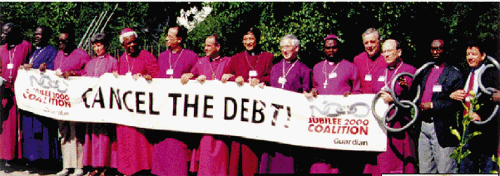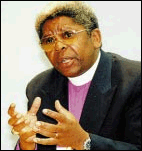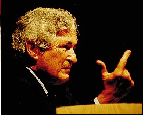|
 Jubilee 2000 vision 'for rich as well as poor' by David Skidmore Archbishop Njongonkulu Ndungane of South Africa put international debt centre-stage at the Lambeth Conference on Friday by calling for cancellation of the debt of developing countries.
``It's a vision that releases the poor from the prison of indebtedness and dependent poverty. It's a vision where God's people have all that is necessary to live a human life,'' said Archbishop Ndungane, who chairs Section One (Called to Full Humanity), which is studying international debt, among other topics. His message was echoed by two other keynote speakers: Bishop Luiz Prado (Pelotas, Brazil) and Bishop Peter Selby (Worcester, England), who chaired the subsection dealing with international debt. Panellists included Bishop Renato Abibico (Northern Luzon, Philippines); Bishop Geralyn Wolf (Rhode Island, US); Samuel Arap Ng'eny, an Anglican Consultative Council member from Kenya; and Bishop Nicodemus Engwalas Okille (Bukedi, Uganda). The session was chaired by Archbishop Orland Lindsay of the West Indies. Jubilee is a vision for rich nations as well as poor ones, Archbishop Ndungane said.The scourge of crushing debt loads is not isolated to Africa and Latin America, he noted, but is tearing the social fabric of Asian and Eurasian countries. Indonesia, South Korea and Thailand--considered the world's ``economic tigers'' only a year ago--are reeling from the effects of drastic currency devaluation. Even the United States, with the world's most powerful economy, is feeling its effects. ``The crisis of international debt... is not just a matter for the poorest countries. Nor is it a matter that affects only sovereign governments,'' Archbishop Ndungane stressed. ``It affects all of us everywhere, all who have become too dependent on credit cards.'' Families in the developed world worry about making mortgage payments, about job security, and the continual erosion of their purchasing power. The sharp contrast between rich and poor in the developing world is becoming a fact in the developed world now. In the United States, which claims the world's highest living standard, the average U.S. worker earns $7.40 an hour while the salary of a corporate chief executive averages $1,566 per hour, he noted. But for those in the developing world the situation is more acute. ``We all live in the grip of an economy hich encourages overlending and over-borrowing, an economy which drives relentlessly into debt. But the poorest, those with very little income to depend on, are not just in the grip of this economy,'' charged Archbishop Ndungane.``They are enslaved by it.''
``I am not angry about the film. I'm upset. I'm upset because it paints a picture of our institution which is quite simply wrong,'' said Mr Wolfensohn. To characterise the World Bank as the villain ``is neither fair nor correct,'' he said. On one point, though, he agreed with the video's producers: ``That there is a significant and overwhelming debt burden on many countries.'' Archbishop Ndungane, who spoke after Mr Wolfensohn, said the bishops had not come to Lambeth ``to cast stones on anyone, but are here to reason together and to find solutions at the dawn of this millennium.'' Everyone is needed on this mission, including the World Bank and the IMF, he said. But when policies are skewed in favour of the creditors, it is reasonable to raise questions. In the concluding presentation, Bishop Peter Selby, chair of the subsection addressing international debt, proclaimed: ``For the sick and the orphaned and the widowed and the children who need food to see tomorrow, cancel the debt!'' Cancellation should come without restrictions, he said.``Cancel the debt uncompromisingly and unconditionally. And we do not ask for charity or generosity; we are looking for simple justice.'' Bishop Selby cautioned the bishops, however, not to place blame on external institutions alone, given the shared responsibility for the debt. ``I'm not keen that this conference should pass any resolutions about world debt or anything else that calls for other people to reexamine their activities and their beliefs if we don't re-examine them ourselves.'' |

 At
a three-hour plenary session of bishops and spouses, Archbishop Ndungane urged the
bishops to follow the Gospel injunction to ``bring good news to the poor'' by supporting
the Jubilee 2000 campaign for cancelling $214 billion in debt burdening the developing
world. Inspired by the tradition reported in Leviticus of holding a Year of Jubilee
every 50 years, the coalition of churches and social outreach organisations is campaigning
for cancellation of the debt of the world's poorest countries by the year 2000.
At
a three-hour plenary session of bishops and spouses, Archbishop Ndungane urged the
bishops to follow the Gospel injunction to ``bring good news to the poor'' by supporting
the Jubilee 2000 campaign for cancelling $214 billion in debt burdening the developing
world. Inspired by the tradition reported in Leviticus of holding a Year of Jubilee
every 50 years, the coalition of churches and social outreach organisations is campaigning
for cancellation of the debt of the world's poorest countries by the year 2000. In
an introduction to the speakers, Archbishop George Carey observed that ``if poverty
in Africa is to be turned around, there are hard decisions to be made, and great
responsibilities'' for everyone involved in the debt crisis. The only discordant
note came from World Bank President James Wolfensohn, who took issue with the video
presentation by Christian Aid that led the session.The video, which reported on the
hardships brought on by crushing debt in Jamaica and Tanzania and criticised the
debt-relief efforts of the World Bank and International Monetary Fund (IMF), prompted
a sharp rebuke from Mr Wolfensohn.
In
an introduction to the speakers, Archbishop George Carey observed that ``if poverty
in Africa is to be turned around, there are hard decisions to be made, and great
responsibilities'' for everyone involved in the debt crisis. The only discordant
note came from World Bank President James Wolfensohn, who took issue with the video
presentation by Christian Aid that led the session.The video, which reported on the
hardships brought on by crushing debt in Jamaica and Tanzania and criticised the
debt-relief efforts of the World Bank and International Monetary Fund (IMF), prompted
a sharp rebuke from Mr Wolfensohn.